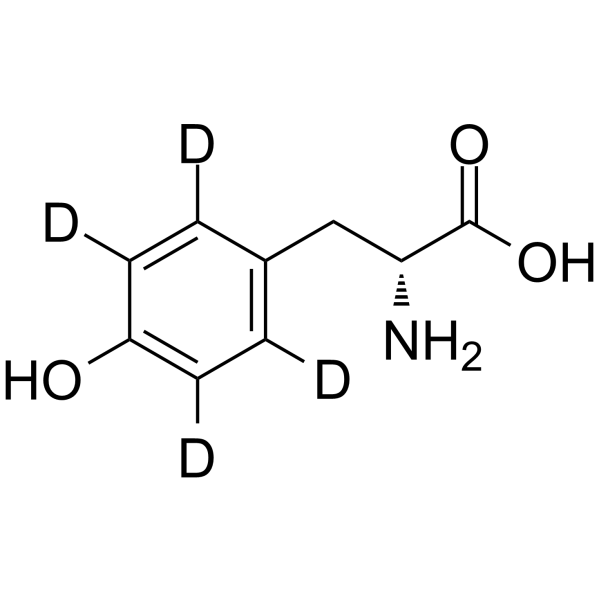D-Tyrosine-d4
Modify Date: 2024-01-07 13:05:44

D-Tyrosine-d4 structure
|
Common Name | D-Tyrosine-d4 | ||
|---|---|---|---|---|
| CAS Number | 944386-47-4 | Molecular Weight | 185.21 | |
| Density | N/A | Boiling Point | N/A | |
| Molecular Formula | C9H7D4NO3 | Melting Point | N/A | |
| MSDS | Chinese USA | Flash Point | N/A | |
Use of D-Tyrosine-d4D-Tyrosine-d4 is the deuterium labeled D-Tyrosine. D-Tyrosine is the D-isomer of tyrosine. D-Tyrosine negatively regulates melanin synthesis by inhibiting tyrosinase activity. D-Tyrosine inhibits biofilm formation and trigger the self-dispersal of biofilms without suppressing bacterial growth[1][2]. |
| Name | D-Tyrosine-2,3,5,6-d4 |
|---|
| Description | D-Tyrosine-d4 is the deuterium labeled D-Tyrosine. D-Tyrosine is the D-isomer of tyrosine. D-Tyrosine negatively regulates melanin synthesis by inhibiting tyrosinase activity. D-Tyrosine inhibits biofilm formation and trigger the self-dispersal of biofilms without suppressing bacterial growth[1][2]. |
|---|---|
| Related Catalog | |
| In Vitro | Stable heavy isotopes of hydrogen, carbon, and other elements have been incorporated into drug molecules, largely as tracers for quantitation during the drug development process. Deuteration has gained attention because of its potential to affect the pharmacokinetic and metabolic profiles of drugs[1]. |
| References |
| Molecular Formula | C9H7D4NO3 |
|---|---|
| Molecular Weight | 185.21 |
| Exact Mass | 181.07400 |
| PSA | 83.55000 |
| LogP | 1.04690 |